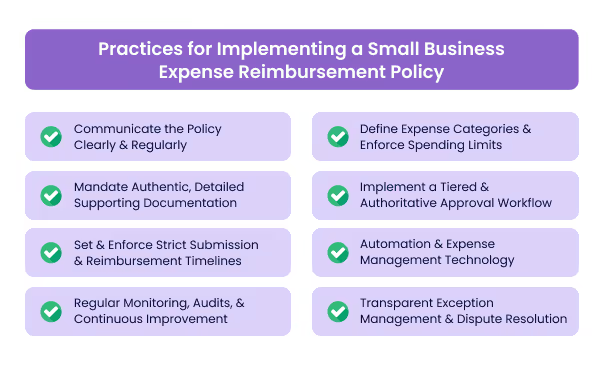In the UAE, where SMEs make up over 90% of businesses, an unclear or inconsistent expense reimbursement policy can quietly drain profitability, cause VAT recovery failures, and even trigger costly audits from the Federal Tax Authority (FTA).
Without clear definitions, documentation rules, and approval workflows, small businesses risk fraud, financial mismanagement, and delayed reimbursements — all of which erode trust between employees and management.
This guide walks you through practical, VAT-compliant best practices for building and enforcing a small business expense reimbursement policy in the UAE. By the end, you’ll know exactly how to set spending limits, protect against fraud, and streamline reimbursements — while keeping the FTA satisfied.
Key Takeaways
- Clear definitions, documentation standards, and approval workflows are fundamental to minimising fraud, ensuring timely payments, and supporting transparent accounting.
- Implementing spending limits, pre-approval processes, and automated expense management significantly enhances efficiency and reduces administrative burden.
- VAT compliance demands meticulous recordkeeping of original invoices and timely submissions to secure input tax recovery and avoid costly penalties.
- Regular monitoring, employee training, and policy updates are essential to overcoming common reimbursement challenges and sustaining operational integrity.
What is Small Business Expense Reimbursement Policy?
A Small Business Expense Reimbursement Policy is a clearly defined set of rules established by a company to govern how employees or stakeholders are reimbursed for expenses they incur while conducting business.
The reimbursement policy defines what qualifies as a reimbursable expense, how those expenses should be reported and documented, the approval process, and the timelines and methods for reimbursement.
This reimbursement policy empowers business owners to safeguard corporate assets, simplify reimbursement operations, and maintain strong compliance with local tax and corporate governance regulations.
Implementing such a policy reduces financial risk, improves operational efficiency, and ensures that expense-related processes are predictable and transparent.
To build on the importance of a well-structured policy, it is essential to specify which expenses qualify for reimbursement, ensuring clarity and compliance throughout the organisation.
What Are Some Reimbursable Expenses for Small Businesses?
Reimbursable expenses are costs that employees incur personally but are directly related to business activities and subsequently reimbursed by the company.
For small businesses, careful delineation of these expenses is essential due to mandatory VAT compliance and strict audit standards enforced by the UAE Federal Tax Authority.
Common reimbursable expenses for small businesses in the UAE are:
- Travel Expenses: Includes airfare, accommodation, local transport (taxis, car rentals), parking, tolls, and mileage for personal vehicles used for business. Must be valid business trips with invoices or receipts.
- Meals and Entertainment: Covers business meals during client meetings or official travel. Expenses must be reasonable, necessary, and well-documented; exclude personal or lavish entertainment.
- Office Supplies and Equipment: Reimbursable items include stationery, computers, printers, software subscriptions, telecom services (business-use phone/internet), and minor office repairs, supported by proof of purchase.
- Professional Development: Costs for job-related training, workshops, seminars, professional memberships, and subscriptions qualify if linked to role enhancement.
- Client and Business Development: Legitimate expenditures on client gifts, business events, conferences, and trade shows are reimbursable when adhering to spending limits and approvals.
- Utility Expenses for Remote Work: Proportional reimbursement for work-related phone and internet costs is allowed when supported by evidence and company policy.
To understand the strategic importance of defining reimbursable expenses, it is equally important to explore why businesses must formalise these guidelines within a structured expense reimbursement policy.
Why do Businesses Need an Expense Reimbursement Policy?
A formal expense reimbursement policy is essential for businesses, especially SMEs, to maintain financial integrity, regulatory compliance, and operational efficiency. It establishes clear controls by defining reimbursable expenses and standardising claim procedures, which significantly reduces risks of overspending and fraud.
Some more reasons why businesses need an expense reimbursement policy are:
- Financial Control and Fraud Prevention: Limits overspending and misuse through defined expense categories and standard approval processes.
- Regulatory Compliance: Ensures adherence to VAT laws with appropriate documentation and record retention, reducing audit risks and penalties.
- Administrative Efficiency: Streamlines reimbursement workflows to reduce delays and simplify finance team workloads.
- Transparency and Accountability: Clarifies employee expectations on allowable expenses, which decreases conflicts and promotes responsible spending.
- Operational Sustainability: Facilitates spending monitoring and budget enforcement, empowering smarter financial decision-making aligned with business goals.
For example, in an SME with 20 employees that frequently incur travel and client entertainment expenses. Without a formal reimbursement policy, expense claims are inconsistent, often lack proper receipts, and approvals are delayed.
This leads to cash flow issues due to slow reimbursements. After implementing a clear policy outlining eligible expenses, strict documentation requirements, and a streamlined approval process, the company improves expense accuracy and gains better financial control.
To build an expense reimbursement policy that effectively mitigates risks and ensures compliance, it is essential to understand its core components.
Key Elements of an Expense Reimbursement Policy
An effective expense reimbursement policy for small businesses, especially within the UAE's regulatory framework, must include the following critical elements:
- Eligible Expenses: Precisely define which expenses qualify for reimbursement, customized to the company’s operational needs. Common categories include travel, meals during business meetings, office supplies, professional development, and client-related costs.
- Documentation Requirements: Mandate submission of original, itemised receipts or authorised digital invoices for all claims. This is necessary not only for internal audit trails but also to comply with the UAE Federal Tax Authority's VAT input tax recovery rules.
- Approval Workflow: Establish a clear hierarchical approval process that specifies who reviews and approves expenses at various thresholds. Higher-value or unusual expenses require pre-approval to prevent budget overruns and fraud.
- Submission Deadlines: Set strict timelines for expense claims, commonly within 30 days from the date the expense was incurred. This facilitates timely accounting, cash flow forecasting, and VAT reporting.
- Reimbursement Procedures: Specify reimbursement methods (e.g., bank transfers, payroll adjustments) and payment cycles (bi-weekly, monthly). This helps maintain predictable cash flow for both employees and the company.
- Recordkeeping and Retention: Define the duration for maintaining expense-related documents, aligned with UAE tax laws (typically five years). Proper record retention supports audit readiness and substantiates VAT claims.
- Exceptions and Dispute Resolution: Provide protocols for handling unusual cases, exceptions, or disputes related to expense claims, including escalation paths to senior management to maintain transparency and control.
To translate a well-defined expense reimbursement policy into effective practice, it is critical to follow best practices that ensure compliance, minimise risks, and optimise operational efficiency.
Best Practices for Implementing a Small Business Expense Reimbursement Policy

For small businesses in the UAE, the successful implementation of an expense reimbursement policy requires precise adherence to regulatory standards, diligent process management, and clear communication.
The following best practices ensure that such policies are effective, compliant, and operationally efficient.
1. Communicate the Policy Clearly and Regularly
- Distribute formal policy documents to all employees, highlighting reimbursable expenses, submission timelines, required documentation, and approval procedures in plain English.
- Conduct mandatory training sessions and refresher workshops at onboarding and periodically thereafter to reinforce understanding of VAT compliance obligations and company-specific rules.
- Use multiple channels (intranet, email, staff meetings) to maintain visibility and provide easily accessible references, reducing misunderstandings and claim errors.
2. Define Expense Categories and Enforce Spending Limits
- Establish precise, tailored expense categories that reflect actual business operations. Categories include:
- Travel Expenses
- Meals and Entertainment
- Office Supplies and Equipment
- Professional Development
- Client and Business Development
- Utility Expenses for Remote Work
- Apply spending caps per category aligned with industry benchmarks and company budget controls (e.g., maximum AED 250 per meal, AED 1500 per hotel night).
- Clearly exclude non-reimbursable or personal expenses such as first-class travel upgrades or luxury restaurant bills, to prevent misuse and auditing issues.
3. Mandate Authentic, Detailed Supporting Documentation
- Require original, itemised receipts or authorised digital invoices that match claim amounts exactly, including vendor name, date, VAT number, and breakdown of charges.
- Reject claims supported by photocopies, bank statements, or handwritten notes, which cannot substantiate VAT recovery and pose compliance risks.
- Implement a document verification step during submission to catch incomplete or inaccurate claims before approval.
4. Implement a Tiered and Authoritative Approval Workflow
- Design a multi-level approval process: direct supervisors handle routine claims, while high-value expenses (e.g., above AED 1,000) require sign-off from finance managers or company directors.
- Include pre-approval mechanisms for extraordinary or non-standard expenses to prevent budget overruns and fraud before costs are incurred.
- Use digital approval systems to ensure transparency, traceability, and timeliness across the workflow.
5. Set and Enforce Strict Submission and Reimbursement Timelines
- Enforce submission of expense claims within 30 days of incurring costs to synchronize with UAE VAT reporting periods and enable timely cash flow management.
- Define reimbursement frequency clearly – typically monthly or bi-weekly payments, so employees can plan personal finances and the company can forecast liquidity.
- Automate reminder alerts to prompt employees about approaching submission deadlines and managers regarding pending approvals.
6. Automation and Expense Management Technology
- Adopt UAE-compliant expense management software that enables digital receipt capture, automatic VAT calculation, and integration with accounting systems to reduce manual error and processing time.
- Use platforms that support workflow customisation, audit trails, and regulatory reporting to aid compliance with the Federal Tax Authority’s requirements.
- Ensure digital solutions allow for mobile access, enabling employees, especially field staff, to submit expense claims in real time.
7. Conduct Regular Monitoring, Audits, and Continuous Improvement
- Schedule quarterly or biannual internal audits focusing on expense claims accuracy, policy adherence, and VAT compliance, using sample checks and data analytics.
- Identify trends such as repeated late submissions or unusual expense patterns that may indicate systemic issues or potential fraud.
- Use audit findings to update and tighten policies, improve training, and refine approval limits or documentation standards.
8. Maintain Transparent Exception Management and Dispute Resolution
- Develop and clearly communicate processes for handling exceptional expenses that fall outside standard categories, ensuring pre-approval and documented justification.
- Create a straightforward dispute resolution pathway allowing employees to appeal rejected claims, with escalation to finance or compliance officers for final decisions.
- Ensure management oversight on disputed matters to uphold fairness and maintain employee trust while protecting company interests.
To build on defined expense categories and spending limits, it is vital to understand the specific VAT compliance requirements tied to expense reimbursements within the UAE’s regulatory environment.
VAT Compliance and Expense Reimbursement in the UAE
VAT compliance for expense reimbursements in the UAE is governed strictly by the FTA. For businesses to reclaim VAT input tax on reimbursed expenses, expenses must be legitimate, documented properly, and aligned with the FTA’s regulations. Failure to comply can trigger costly audits, financial penalties, and reputational damage.
Important VAT compliance points for expense reimbursements:
- Valid VAT invoices: Reimbursement claims must be supported by valid VAT invoices showing supplier name, VAT number, date, amount, and VAT charged.
- Original documentation: Photocopies, statements, or incomplete receipts are not accepted for VAT input tax recovery.
- Eligible business expenses: Only expenses that are legitimate, business-related, and compliant with UAE VAT law can be claimed.
- Accurate record retention: All records supporting VAT claims must be securely kept for a minimum of five years from the end of the tax period.
- Separation of personal and business expenses: Businesses must have mechanisms to identify and exclude non-business or personal expenses from VAT claims.
- Timely submission: Expense claims should be submitted promptly (usually within 30 days of incurrence) to ensure input VAT recovery aligns with tax reporting periods.
Businesses can significantly enhance their expense reimbursement processes by using specialised solutions tailored for the UAE market.
Simplify Your Expense Reimbursement Policy With Alaan
Alaan offers an integrated digital expense management platform tailored to UAE businesses, combining VAT-compliant reimbursement processes with advanced corporate card and spend management features.
The solution automates expense capture, enforces multi-level approvals, and delivers real-time visibility into company spending, thereby reducing manual errors, fraud risk, and administrative delays.
Key Capabilities include:
- Corporate Cards Integration: Issue Alaan corporate cards to employees with preset spending limits and category restrictions, enabling precise control over business expenses and reducing the need for manual reimbursement claims.

- Automated VAT Compliance: Extracts VAT details from receipts and invoices linked to card transactions for seamless input tax recovery compliant with UAE Federal Tax Authority regulations.
- Customisable Spend Management: Set and monitor budgets, enforce category-based spending caps, and instantly track expenses against limits to prevent overspending and enhance financial discipline.
- Streamlined Approval Workflows: Configurable, multi-tiered claim approvals integrated with both corporate card transactions and manual claims, ensuring comprehensive oversight.
- Digital Recordkeeping and Audit Trails: Securely stores all transaction data and original receipts, satisfying mandatory five-year retention policies and simplifying audits.
- Mobile and Web Access: Employees can submit expenses, capture receipt images, and track approvals on the go, bolstering timely submissions and compliance.
- Accounting Integration: Synchronises expense and card data with existing accounting and ERP systems to streamline VAT filing and reporting.
Take control of your finance processes today. Book a personalised demo with Alaan to see how combining corporate cards with automated expense management can revolutionise your company’s spend oversight while guaranteeing full VAT compliance.
Conclusion
A well-structured small business expense reimbursement policy is essential for UAE companies to safeguard financial integrity, ensure VAT compliance, and optimise operational efficiency. Clear expense definitions, strict documentation requirements, controlled approval workflows, and timely reimbursements are key to reducing risks of fraud, audit penalties, and administrative delays.
At Alaan, we understand these challenges deeply. That’s why we’re committed to providing you with a seamless, intelligent platform that simplifies expense management, keeps you fully compliant, and empowers your team to focus on what matters most, growing your business.
Let's transform your expense process together. Book a demo today and experience how effortless compliance and smart spend management can be.
Frequently Asked Questions (FAQs)
1. Can businesses reimburse personal expenses if they are partly used for work?
No. Personal expenses are generally non-reimbursable unless a clear business use portion is documented and approved under the policy. Clear separation is required for VAT compliance.
2. What documentation is mandatory to support expense claims in the UAE?
Original, itemised receipts or authorised digital invoices containing supplier VAT registration details are mandatory to ensure VAT input tax recovery.
3. Are there VAT implications when employees use corporate cards for personal expenses?
Yes. Personal expenses charged to corporate cards are excluded from VAT recovery and must be identified and separated promptly to avoid compliance issues.
4. How long must expense records be retained in the UAE for audit purposes?
Expense documentation must be securely retained for at least five years, as mandated by the UAE Federal Tax Authority.
5. Is pre-approval required for all expense claims under UAE SME reimbursement policies?
Not all; pre-approval is typically required for high-value or non-routine expenses to maintain budget control and prevent fraud, while routine, smaller expenses may follow a standard approval process.
6. What are the VAT and compliance risks if expense claims are submitted late in the UAE?
Late submissions risk rejection, delayed reimbursements, and possible non-compliance with VAT reporting periods, potentially causing cash flow and audit issues. Prompt submission is critical.


.avif)







%201.avif)